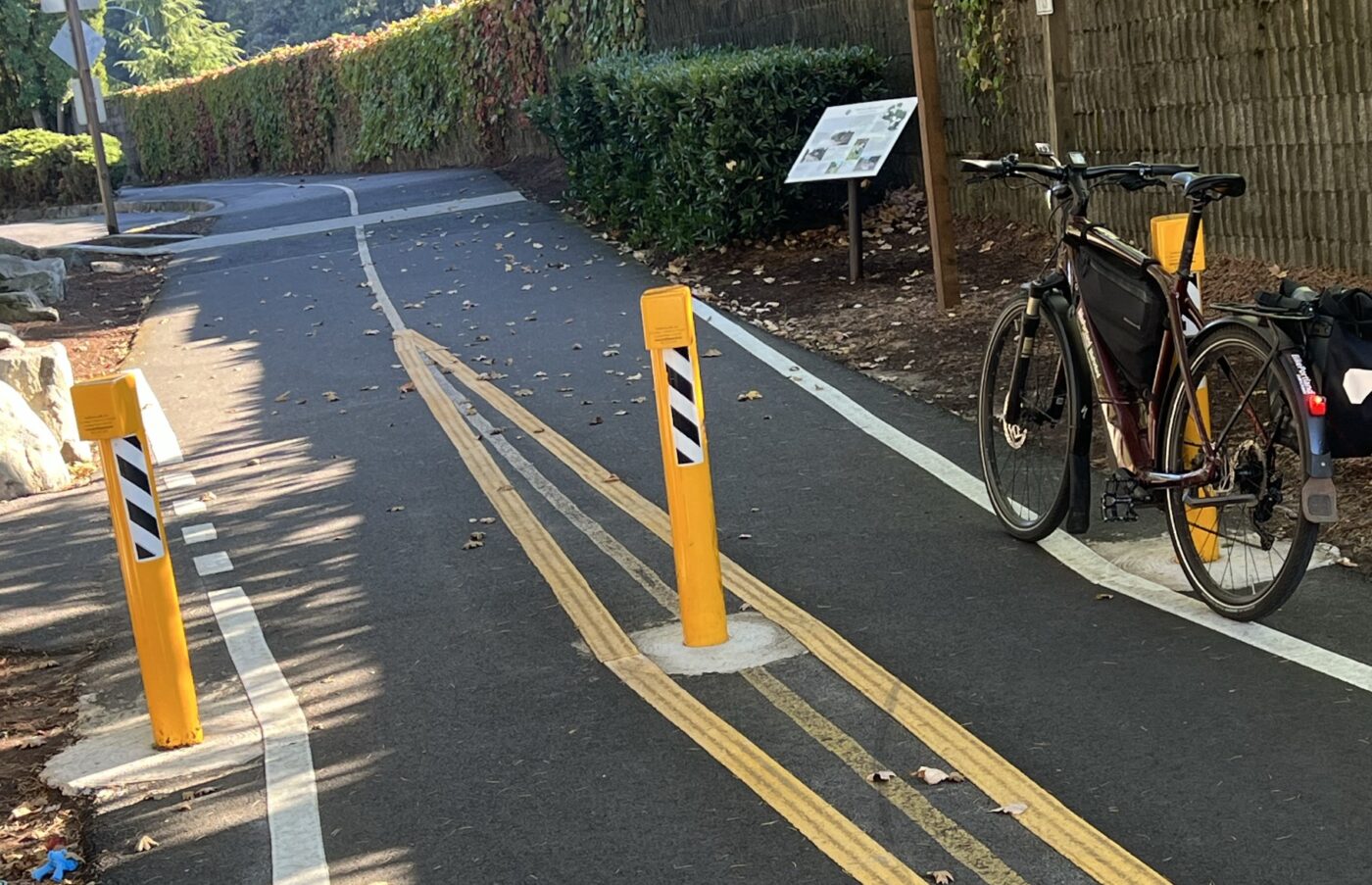
After years of safety concerns, the Oregon Department of Transportation says they’ll install more bollards to prevent people from driving cars on the I-205 multi-use path.
The number of people illegally driving cars on the 205 path and other paths in the region has increased dramatically in the past decade. Official numbers aren’t available, but anecdotally it’s become common enough that for many people it’s the final straw (along with personal safety fears, trash, and other hazards) that leads them to avoid the paths altogether.
Today at the Transportation Policy Alternatives Committee (TPAC) hosted by Metro, ODOT Region 1 Policy Manager Chris Ford announced something will finally be done about it. “ODOT is funding the addition of bollards at key locations along the I-205 and I-84 multi-use paths,” Ford shared. “This is to prevent vehicles from driving onto the multi-use paths.”
I followed up with the ODOT Region 1 media spokesperson and have confirmed that a total of 29 bollards will be installed: 21 of them on the I-205 path and 8 on the I-84 path. The I-205 project boundaries are from SE Holgate to Crystal Springs Boulevard. On I-84 the bollards will go in between NE 122nd and NE 181st (in Gresham).
ODOT will spend $450,000 on the project, which they say will also reduce vandalism to lights and electrical systems along the path.
In April 2023, ODOT installed several sets bollards on the I-205 path between NE Prescott and NE Fremont where it goes through the City of Maywood Park (see above). In May 2013, the Washington Department of Transportation installed bollards at an entrance to the I-205 path north of the Columbia River.
ODOT says this latest attempt to prevent car users from accessing the paths has already begun and they expect all construction work to be completed by June 30th.
Check the ODOT project website for more information.



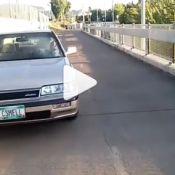
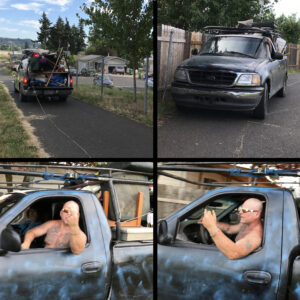
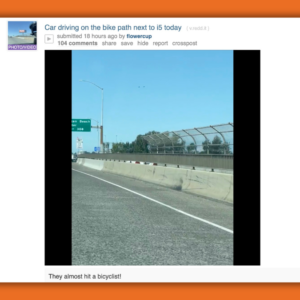
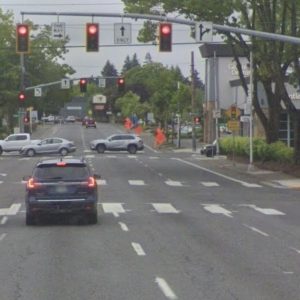
Thanks for reading.
BikePortland has served this community with independent community journalism since 2005. We rely on subscriptions from readers like you to survive. Your financial support is vital in keeping this valuable resource alive and well.
Please subscribe today to strengthen and expand our work.
15k per bollard? I hope something else is happening with this project
It seems a bit on the steep side, but not entirely out of the ballpark. I’m guessing these bollards are designed to dead stop a vehicle of a certain size moving at a certain speed. That takes thick, strong materials buried deep and a fair amount of concrete as backfill. That’s a crew of 3-4 making each $100-$150/hr (pay+benefits+taxes) probably taking half a day or more for each individual bollard. I’m also guessing that the overall $450k budget includes the full design, where ODOT has only developed the initial scope. So that’s an engineer or two from a consulting firm doing your design work, plus the ODOT team doing regular progress checks and design review at several pre-defined milestones. Each of those people are another $150+/hr for at least a few hours each week, more when it’s review and comment time, for at least a couple of months. You’re disturbing soil, so that probably triggers an environmental review, even if it’s just for a someone to certify that the ground has previously been disturbed and it qualifies for a categorical exclusion–but if the bollards are going deep enough, that’s maybe newly disturbed soil that needs a closer look. That’s review officers and technicians to do the testing. And there’s 5%-10% overhead and profit for any private contractors you hire to do any of that work. It adds up pretty quickly, and before you know it you have a $15k bollard when all is said and done. It’s certainly more expensive than what you might be able to do at home with a GC you hired off the street, but that’s the tradeoff of making sure the government is doing everything right by dotting their Is and crossing their Ts.
Yikes! That’s a lot of $ in a city and County with massive budget shortfalls. I’m surprised (but grateful) the state is helping us out. Regardless, it’s yet another cost of the homeless crisis that we have not adequately addressed and some would argue have enabled in Portland.
Unfortunately when asked how much they spent on bicycle infrastructure ODOT will likely include this even though the ONLY reason that bollards are needed are cars and the drivers who can’t seem to keep them on the road and off the MUP’s.
Do you think they count the Bikes Prohibited from Freeway signs as bicycle or car infrastructure?
Lol. Howbout those crosswalk closed signs? That’s vital pedestrian safety infrastructure that’s helping stitch together communities!!
Indeed. The headline and the budget item should be “ODOT will spend $450,000 on infrastructure to keep drivers from driving places it is illegal to drive.”
I think it’s unbelievable that the city has to spend hundreds (presumably) thousands per concrete block along Powell to prevent people from parking in a parking spot (I’m talking about the frontage roads). Everything would cost so much less if a small percentage of road users would just follow the rules and not ruin it for everyone else.
Think how much money we could save if the tiny fraction of road users who commit murder, robbery, and theft would just knock it off.
Watts, your bothsidesism is getting out of hand.
In this case, you feel satirizing an anti-camping comment that is itself plausibly satirizing both the “war on cars” and “why can’t we all get along” sentiments is playing to “both sides”?
What are those sides, anyway? Or did you miss my point altogether?
Imagine if our MUPs were not lawless no-mans-lands where all manner of destructive behavior has been normalized for the past decade.
I hope they’re installed as pictured- the “bollards” on the springwater tend to be anti-trailer and far too narrow.
If they exist at all. Far too common to see the chains cut and the bollards missing completely.
Too bad none are planned for I-5 between Delta Park and the I-5 bridge, I regularly see cars on this section and have contacted ODOT multiple times.
End tolerance for illegal camping on our MUPs and this problem largely goes away.
Yes, people have occasionally operated cars on the paths long before our “homelessness crisis”, but it was once rare enough to that an isolated incident would get covered on BikePortland. That’s not the case anymore. Vehicle usage in our non-motorized spaces has been normalized and defended under the umbrella of letting the homeless do as they please, wherever they please, as the guiding policy directive across all city and county government. Many in the bike community sign off on this approach as well, baffling as it may be.
That’s just the reality of the situation: the primary motivation for driving a car on the path is to access campsites. Even homeless service providers do it.
This madness has gone on for far too long.
I was the I-205 bike path cleaner for ODOT in 1987, and pulled my trailer between Clackamas Town Center and the Washington side of the I-205 bridge, from May to November, Monday through Friday. Never once saw a motor vehicle on the path other than ODOT service workers. Path was pretty clean in those days, too…times have changed.
Looks like those bollards are going to be vulnerable to angle grinders and/or being rammed by cars. Why not just drop some jersey barriers? With the $425,000 they save, they could have a rapid response team that moves the jersey barriers in case an emergency vehicle needs to get up there.
Indeed, most access points for the 205 path had bollards at one point. I suppose we’re not allowed to talk about who keeps cutting them down, because that would be an inconvenient truth for the performative progressives of Portland.
Even better, they could buy 29 $2000 cars on Craigslist, park them so they block cars from entering the path, and let the fire department keep the keys. What will we do with the $390,000 we’d save?